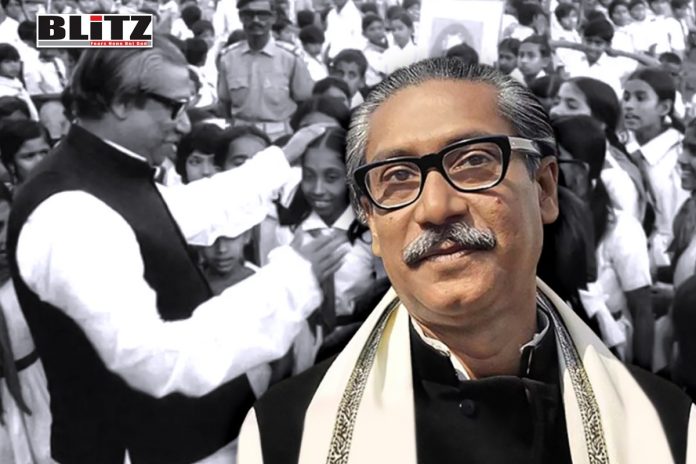Bangabandhu Sheikh Mujibur Rahman, affectionately hailed as the Father of the Nation in Bangladesh, was not only a political luminary but also a visionary leader whose indelible mark on the landscape of education reform continues to resonate profoundly. Born on March 17, 1920, in Tungipara, Gopalganj, his journey from a fervent advocate for the right to education to the architect of Bangladesh’s educational metamorphosis epitomizes his unwavering dedication to societal advancement through enlightenment and knowledge dissemination.
From the outset of his life, Bangabandhu Sheikh Mujibur Rahman discerned the pivotal role of education within his political ideology. Even during his formative years, he encountered adversity, enduring imprisonment at a mere 18 years old due to his steadfast advocacy for educational rights. This early confrontation with oppression solidified his conviction in the catalytic potential of education, serving as a bedrock for his subsequent efforts to revolutionize the educational framework of Bangladesh. His enduring commitment to this cause became a guiding force propelling his relentless pursuit of a more equitable and enlightened society.
Throughout the tumultuous years leading up to Bangladesh’s independence, Bangabandhu tirelessly championed the cause of education as a fundamental human right. In his stirring speeches and impassioned rhetoric, he emphasized the pivotal role of education in fostering a just and equitable society. His vision extended beyond mere academic pursuits; he envisaged an educational system that nurtured individuals imbued with moral values and a sense of social responsibility.
After the arduous struggle for independence culminated in Bangladesh’s liberation in 1971, Bangabandhu Sheikh Mujibur Rahman embarked on a comprehensive agenda of educational reform, driven by the noble aim of democratizing access to quality education. His resolute dedication to this cause manifested in ambitious initiatives aimed at broadening the horizons of higher education and cultivating an environment conducive to intellectual exploration. Notably, he spearheaded the grant of autonomy to numerous public universities, signaling a decisive departure from the stifling educational policies of the past. This pivotal move heralded an epoch of academic liberation, fostering a climate of unfettered inquiry and innovative scholarship, laying the groundwork for a brighter future for generations to come.
Central to Bangabandhu’s educational vision was the principle of equal opportunity for all, regardless of socio-economic status. He undertook sweeping reforms, nationalizing thousands of primary schools and ensuring that every child had access to education without financial barriers. His unwavering dedication to inclusive education was enshrined in the Constitution of the People’s Republic of Bangladesh, which guaranteed free and compulsory education to all citizens.
Bangabandhu Sheikh Mujibur Rahman’s deep admiration for educators and his profound regard for the teaching profession permeated every facet of his leadership. He recognized the pivotal role teachers played in molding the future of Bangladesh and tirelessly advocated for their rights. Despite encountering opposition, he steadfastly pursued his vision of an inclusive educational system that empowered both students and educators, underscoring his unwavering dedication to fostering a society founded on equality and opportunity.
The nationalization of primary schools under Bangabandhu’s leadership symbolized a paradigm shift towards inclusive education. His insistence on equalizing the status and salary of primary teachers underscored his commitment to recognizing their invaluable contribution to society. Despite facing resistance, Bangabandhu remained steadfast in his conviction that education should be a transformative force for societal change.
The tragic assassination of Bangabandhu Sheikh Mujibur Rahman on August 15, 1975, abruptly halted his visionary leadership. Yet, despite this grievous loss, his legacy in the realm of education perseveres as an enduring source of hope and inspiration for generations to come. His steadfast dedication to the advancement of education and his unwavering belief in its transformative potential leave an indelible mark, resonating not only within the borders of Bangladesh but also extending far beyond. His vision continues to guide efforts towards creating a more enlightened and equitable society, serving as a guiding light for the future.
As Bangladesh strides forward on its path towards progress and development, the legacy of Bangabandhu Sheikh Mujibur Rahman stands as a poignant testament to the enduring significance of education in sculpting a brighter tomorrow for all. His visionary blueprint for educational reform transcends temporal and spatial boundaries, offering illumination to nations worldwide. In cherishing his memory, we reiterate our steadfast dedication to actualizing his dream of a society characterized by justice and equity, rooted in the transformative power of education and enlightenment. Through our collective endeavors, we honor his legacy by endeavoring to build a world where education serves as the cornerstone of societal advancement and inclusivity.




